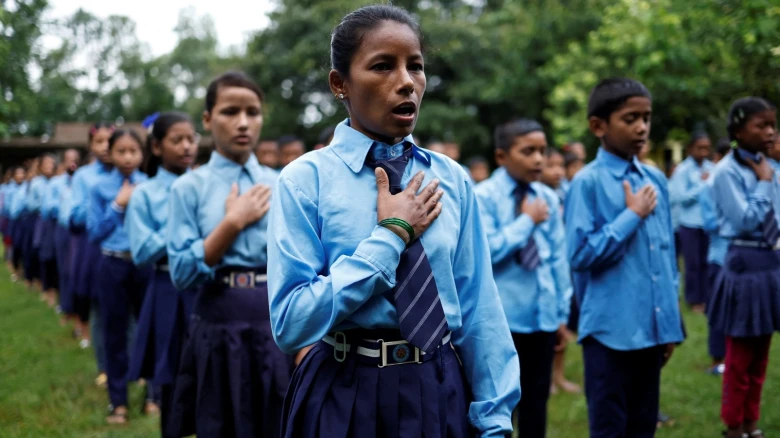North East

Her day starts at daybreak in a two-room, bare-brick building with a tin roof that she shares with her mother-in-law, sons Resham and Arjun, and goats that are corralled in one section.
Digital Desk: Parwati Sunar,
a Nepali mother of two, has returned to the educational system she left when
she eloped with a guy seven years her senior at the age of 15, and now she attends
the same school as her son.
Sunar, a seventh-grader in
the Himalayan nation's village of Punarbas, said to Reuters from her classroom:
"I enjoy learning and am proud to attend alongside students who are like
my own children."
In the 29 million-person
nation, only approximately 57% of women are read. Sunar, 27, expressed her
desire to become "literate enough" to manage household finances.
She remarked, "I think
I should not have left my school," citing the need to make up the classes
she missed after giving birth to her first child at the age of 16.
Resham, her 11-year-old son,
who is a grade below her and rides a pillion while she bikes to the neighbouring
computer lessons they both attend, remarked, "I feel happy to go to school
with mum.
He said that his mother
wished he might pursue a career in medicine, saying, "We converse while we
walk to school and we learn from our discourse."

Sunar did poorly in school
but was a quick learner, according to Bharat Basnet, the principal of the rural
school Jeevan Jyoti.
Her day starts at daybreak
in a two-room, bare-brick building with a tin roof that she shares with her
mother-in-law, sons Resham and Arjun, and goats that are corralled in one
section. The family uses a neighbouring piece of public land because their home
doesn't have a toilet.
They work in the lush fields
surrounding their home, take daily baths in water from a handpump outside, and
even bake cakes for birthdays, which Resham cheerfully commemorates with a
hibiscus flower tucked behind one ear.
Sunar's spouse supports his
family by working as a labourer in Chennai, a city in southern India.
The lowest caste in Hinduism
is the Dalit community, sometimes known as the untouchables, and according to
Sunar, the family has not experienced any mistreatment as a result.
Nobody discriminates against
my family or me, she insisted.
After a straightforward
breakfast of rice and lentils, Sunar dresses her son in the school uniform of a
light blue blouse and skirt with a striped tie, and they walk for 20 minutes to
the school, which is likewise a building with a tin roof and is surrounded by
trees.
One of her 14-year-old
classmates, Bijay B.K., stated it was enjoyable to be in Sunar's class.
He called his older sister
Didi, which is how Nepalis refer to them. She aids me in my studies, and I aid
hers.
In Nepal, where they still
experience discrimination and child marriage is common despite being against
the law, Sunar's efforts may encourage local women who are eager to study
beyond their immediate surroundings.
One of her neighbours,
Shruti Sunar, a student in the school's 10th grade who is not related,
remarked of her, "She is doing a terrific job." "I believe
others should go to education as she has."
According to official
figures, 94.4% of girls are enrolled in basic education, or grades 1 through 8,
but Krishna Thapa, president of the Federation of Community Schools, claimed
that over half of those students left their studies early due to issues
including a lack of textbooks or financial hardship.

Thapa continued,
"Schools lack infrastructure, such as restrooms for ladies." Because
there are no restrooms, the majority of females quit school during this time.
But Sunar claimed she was
motivated to complete the 12th grade and gave up her work as a housemaid in
neighbouring India to focus on her academics.
This is the current idea,
she continued. I have no idea what is in store for me.
Leave A Comment